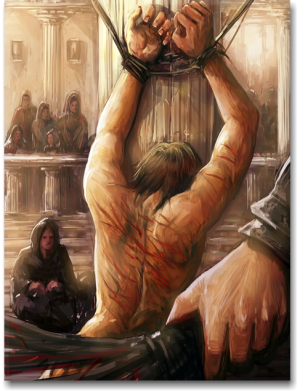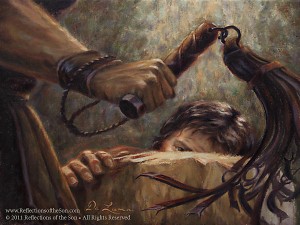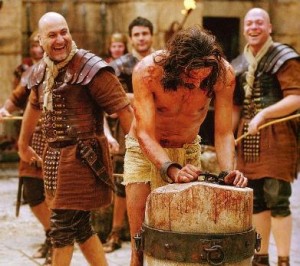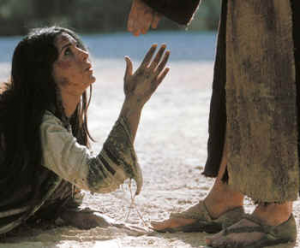26. Scourging & Healing

Surely our griefs He Himself bore, and our sorrows He carried; yet we ourselves esteemed Him stricken, smitten of God, and afflicted. But He was pierced through for our transgressions, He was crushed for our iniquities; the chastening for our well-being fell upon Him, and by His scourging we are healed. (Isaiah 53:4-5)
The Hebrew word for scourging appears only seven times in the Old Testament. They are translated are: bruise, scourging, striking, stripes, welts, and wounds.
There is a notable passage in Proverbs which states: Stripes that wound scour away evil, and strokes reach the innermost parts. (Proverbs 20:30) Solomon reveals to us what Christ’s death on the cross accomplished for us: evil is scoured away and we are changed as deeply as the innermost parts.
Innermost has to do with inner chambers of a house, the bedroom, and its root means to encompass, surround, and enclose. These are the places that are the safest, and can be the most intimate.
Parts has to do with our guts and can mean belly, abdomen or womb.
Who’s applying the whip? It’s a question that deserves an answer. When Solomon penned this verse I have no doubt the Holy Spirit had in mind the stripes Christ would bear. Solomon however, probably thought the one using the whip was one (like a father or a kindly master) who had the good of the erring party in mind. But a beating for the sake of brutality (as with the Romans) would have no therapeutic properties, no cleansing, no scouring. These two scenarios speak more to the physical rather than the eternal, and while the former can point us in the direction of eternity, and the latter may cause us to flee in that direction. But if we focus on the One Who received the stripes—and why—we are look straight into the face of our peace, healing and salvation.
The scourging by the Romans could not accomplish our healing. What would it take, to take away the sins of the world? Was it God the Father Who wielded the whip? We have seen previously at the end of verse four: yet we ourselves esteemed Him stricken, smitten of God, and afflicted. So if is it the Son bearing the stripes and the Father wielding the whip, then the scouring (the healing) would indeed be both everlasting and deep (life-changing).
Healer is a word used in one of the LORD’s names: And He said, “If you will give earnest heed to the voice of the LORD your God, and do what is right in His sight, and give ear to His commandments, and keep all His statutes, I will put none of the diseases on you which I have put on the Egyptians; for I, the LORD, am your healer.” (Exodus 15:26) Yahweh Raphah.
Healing was a significant part of Christ’s ministry: The Spirit of the Lord GOD is upon me, because the LORD has anointed me to bring good news to the afflicted; He has sent me to bind up the brokenhearted, to proclaim liberty to captives and freedom to prisoners. (Isaiah 61:1)
When Jesus came into Peter’s home, He saw his mother-in-law lying sick in bed with a fever. He touched her hand, and the fever left her; and she got up and waited on Him. When evening came, they brought to Him many who were demon-possessed; and He cast out the spirits with a word, and healed all who were ill. This was to fulfill what was spoken through Isaiah the prophet: “He Himself took our infirmities and carried away our diseases.” (Matthew 8:14-17)

And large crowds came to Him, bringing with them those who were lame, crippled, blind, mute, and many others, and they laid them down at His feet; and He healed them. So the crowd marveled as they saw the mute speaking, the crippled restored, and the lame walking, and the blind seeing; and they glorified the God of Israel. (Matthew 15:30-31)
He entered again into a synagogue; and a man was there whose hand was withered. They were watching Him to see if He would heal him on the Sabbath, so that they might accuse Him. He said to the man with the withered hand, “Get up and come forward!” And He said to them, “Is it lawful to do good or to do harm on the Sabbath, to save a life or to kill?” But they kept silent. After looking around at them with anger, grieved at their hardness of heart, He said to the man, “Stretch out your hand.” And he stretched it out, and his hand was restored. The Pharisees went out and immediately began conspiring with the Herodians against Him, as to how they might destroy Him. ( Mark 3:1-6) This passage illustrates just how broken we are, and how desperate we are in need of healing. Sometimes the healing that is needed is not physical, but spiritual. Perhaps we need to be healed from legalism.
Maybe we need to be healed of our preconceptions: Jesus went out from there and came into His hometown; and His disciples followed Him. When the Sabbath came, He began to teach in the synagogue; and the many listeners were astonished, saying, “Where did this man get these things, and what is this wisdom given to Him, and such miracles as these performed by His hands? Is not this the carpenter, the son of Mary, and brother of James and Joses and Judas and Simon? Are not His sisters here with us?” And they took offense at Him. Jesus said to them, “A prophet is not without honor except in his hometown and among his own relatives and in his own household.” And He could do no miracle there except that He laid His hands on a few sick people and healed them. And He wondered at their unbelief. And He was going around the villages teaching. ( Mark 6:1-6) Healing and teaching was Jesus dual mode of operation. But both can be hindered by our unbelief.
One day He was teaching; and there were some Pharisees and teachers of the law sitting there, who had come from every village of Galilee and Judea and from Jerusalem; and the power of the Lord was present for Him to perform healing. And some men were carrying on a bed a man who was paralyzed; and they were trying to bring him in and to set him down in front of Him. But not finding any way to bring him in because of the crowd, they went up on the roof and let him down through the tiles with his stretcher, into the middle of the crowd, in front of Jesus. Seeing their faith, He said, “Friend, your sins are forgiven you.” The scribes and the Pharisees began to reason, saying, “Who is this man who speaks blasphemies? Who can forgive sins, but God alone?” But Jesus, aware of their reasonings, answered and said to them, “Why are you reasoning in your hearts? Which is easier, to say, ‘Your sins have been forgiven you,’ or to say, ‘Get up and walk’? But, so that you may know that the Son of Man has authority on earth to forgive sins,”—He said to the paralytic— “I say to you, get up, and pick up your stretcher and go home.” Immediately he got up before them, and picked up what he had been lying on, and went home glorifying God. They were all struck with astonishment and began glorifying God; and they were filled with fear, saying, “We have seen remarkable things today.” ( Luke 5:17-26) Healing and forgiveness are closely related. And is there any wonder when we find grief being defined as sickness and disease. We find in the midst of all of this sin, that we need forgiveness and healing.
Now there is in Jerusalem by the sheep gate a pool, which is called in Hebrew Bethesda, having five porticoes. In these lay a multitude of those who were sick, blind, lame, and withered, waiting for the moving of the waters; for an angel of the Lord went down at certain seasons into the pool and stirred up the water; whoever then first, after the stirring up of the water, stepped in was made well from whatever disease with which he was afflicted. A man was there who had been ill for thirty-eight years. When Jesus saw him lying there, and knew that he had already been a long time in that condition, He said to him, “Do you wish to get well?” The sick man answered Him, “Sir, I have no man to put me into the pool when the water is stirred up, but while I am coming, another steps down before me.” Jesus said to him, “Get up, pick up your pallet and walk.” Immediately the man became well, and picked up his pallet and began to walk. ( John 5:2-9) Have we grown comfortable—or at least accustomed—with our infirmities? Do you want to be healed? Do you want your sins forgiven?
This is the sixth substitution: For our healing, He was scourged, bruised, and wounded.











